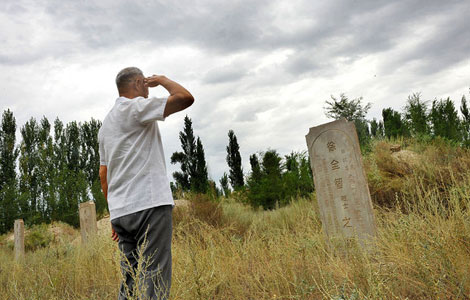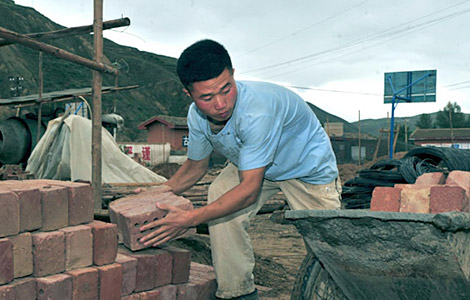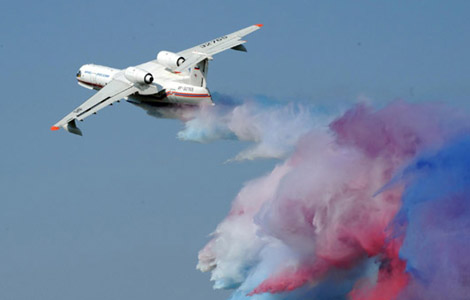Company ordered to halt production after dumping toxic waste
Updated: 2011-08-17 22:04
(Xinhua)
|
|||||||||||
QUJING, Yunnan - A chemical company in Southwest China's Yunnan province has been forced to suspend production after it was found to be dumping carcinogenic industrial chemicals into a reservoir that feeds one of China's largest rivers.
Luliang Chemical Industry Co., Ltd. suspended its production operations on Sunday. The company was found to have dumped over 5,000 metric tons of chromium-contaminated waste at dumping sites located near the Chachong Reservoir in the town of Yuezhen, as well as in the hills near the city of Qujing in Luliang county.
Fourteen local residents have been diagnosed with cancer since 2002; it is believed that their illnesses may have been caused by contaminated drinking water. Over 3,000 local residents are currently living near the company's dump sites.
Polluted water in the Chachong Reservoir has been blamed for the deaths of 77 livestock so far; the two families who owned the livestock received a compensatory payment of 95,000 yuan ($14,615) from the company on Tuesday. They were also paid another 16,000 yuan to cover medical treatment for their remaining livestock, some of whom have been sickened from drinking the contaminated water.
Luliang Chemical Industry Co., Ltd. is one of Asia's largest producers of chromium sulfate, a chemical leather tanning agent. While the company has claimed that it has cleaned up its dump sites in Luliang County, many of the region's villagers believe there is still more work to be done.
Some of the polluted water in the reservoir has already been processed and drained into the Nanpan River. This river forms the headwaters of the Pearl River, a major river that flows through southern China.
The drainage basin of the Nanpan River provides water for a major grain-producing area in Yunnan province. This has created considerable cause for concern on the part of villagers and government officials alike in Yunnan.
No human deaths have been attributed to the chromium pollution. According to a spokesman from the Qujing municipal government, over 9,000 metric tons of chromium-contaminated soil have been cleaned up and relocated by the company.
However, yellow and green crystals, a sign of chromium contamination, can still be seen at some of the dumping sites.
"The chromium waste contains hexavalent chromium, which is highly toxic and carcinogenic. It can dissolve in water and flow into the reservoir when it rains," said Yin Zhengwu, deputy head of the environmental monitoring unit of Qujing's Qilin District.
To avoid polluting the area any further, 40,000 cubic meters of chromium-contaminated water were drained from the reservoir into the Nanpan River after being processed in accordance with national safety standards, said Yang Shuxian, director of the Qujing Municipal Environmental Protection Bureau.
The city's drinking water supplies were not affected by the contamination, according to the bureau. Yunnan's provincial environmental authorities said that the Pearl River's water quality is in accordance with national standards.
Despite the assurances of local environmental officials, there are signs that Luliang county may still be in danger.
Tang Zaiyang, the company's general manager, claimed that the company was not aware of any illegal dumping before recent discoveries came to light. He stated that while the dumping sites used to contain 280,000 metric tons of chromium waste, the company's environmental cleanup crews have reduced the amount to just 100,000 metric tons.
Tang said the company, which produces 20,000 metric tons of chromium waste annually, used government funds to cover some of the cost of processing the waste. He added that the company itself paid for the remainder of the cost.
"There were already 280,000 metric tons of chromium waste here when our company bought this factory in 2003. Local employees said the waste had been there for at least 10 years," he said.
The factory was originally built in 1989; at that time, there was nothing separating the factory from the Nanpan River. Environmental regulations passed in 2004 required the company to build a single one-meter-high wall to separate the two; the company was also asked to bury its dumping sites, Tang said.
The company is located in Luliang's Xiqiao Industrial Zone, which was established in the 1970s. The zone used to be located some distance from Luliang's urban areas.
However, the county has developed around the zone due to rapid development in recent years, according to Li Fuming, director of the Luliang Industry and Information Technology Bureau.
Luliang is home to 29 heavy industrial companies, 15 of which are headquartered in the industrial zone, Li said. These companies include paper mills, fertilizer plants and cement factories, he said.
While some of the zone's biggest polluters have already moved out, others have remained, Li said. He described the industrial zone as a "time bomb."
Luliang's village of Xinlong has acquired the unsavory nickname of "cancer village," as over a dozen of its residents have been diagnosed with the disease since 2002.
The village is relatively small for China, with a population of just 3,563 people. However, a disproportionately high number of its residents have gotten cancer in recent years. Local hospitals admitted 14 cancer patients between 2002 and 2010; 11 of them died during the same period of time. Their ages varied from 9 to 77 years old, said Qian Xin, deputy director of the center for disease control in Luliang county.
The county's tap water has been declared safe to drink after being examined four times by the disease control center since 2009, Qian said.
However, the village has more than one source of drinking water. More than half of the village's residents drink water that is sourced from the Chachong Reservoir, while a third of the villagers drink well water, which is not tested by the center, Qian said.
Hot Topics
Rainstorms cause flooding in Gannan Tibet autonomous prefecture, Gansu province, on August 15, 2011.
Editor's Picks

|

|

|

|

|

|







